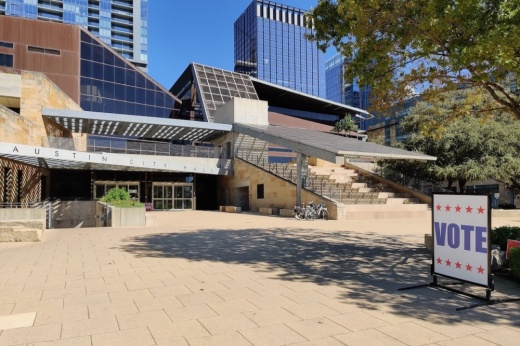The potential change comes after a series of civic elections featuring measures that landed on the ballot thanks to resident initiative petitions. Looking ahead, the city's May election also features two competing police oversight proposals that each stemmed from successful petition campaigns.
In recent years, residents and political organizations have utilized the power of initiative—to varying success—to hold elections over ride-hailing regulations, the city's election calendar and government system, marijuana enforcement, police staffing, criminalizing public camping and sleeping, and ranked-choice voting. In addition to specific policy topics, petitions may also be used for referendums to roll back City Council action, recalls of council members, and amendments to the city charter.
Petition process
In all Texas cities, residents who collect enough backing for policy changes can submit their proposals to elected leaders—although the required level of support varies widely between municipalities.
Austin's signature threshold for the consideration of an initiative, a referendum and a charter amendment petitions is either 5% of the city's registered voter pool or 20,000 supporters, whichever is fewer. Recall petitions require a higher signature limit of 10% of constituent voters.
The 5% limit for most petitions no longer applies thanks to ongoing population growth, meaning any person or group who collects at least 20,000 valid names can compel an election over their policy idea. Austin had previously mandated that 10% of registered voters sign a petition for validation. Austinites voted in 2012 to reduce that limit and move city rules in line with the current baseline outlined in state law.
Based on city charters and local voter information across the state, Austin's 20,000-signature threshold is by far the lowest among the largest Texas cities and now represents only about 3% of the voter roll. Previous city analysis also found Austin's limit was below almost all peer cities nationally, aside from Denver.Both organizations behind Proposition A and Proposition B in Austin's upcoming May election hit that 20,000-name mark but may not have gotten their measures on the ballot with higher limits in place.
According to City Clerk Myrna Rios's validations of the recent petitions, Equity Action—the criminal justice nonprofit behind Proposition A—collected at least 20,451 valid signatures out of 32,674 total submitted for its Austin Police Oversight Act. Voters for Oversight and Police Accountability, the Austin Police Association-backed group behind Proposition B, collected at least 22,007 valid signatures out of 37,113 total submitted.
The clerk's office also received a total of 633 requests from residents seeking to withdraw their names from VOPA's petition, and 461 were removed.
Changes sought
City officials March 9 will look into creating a new citizen commission to propose changes to the city charter that could bump the petition signature limit up.
A resolution drafted by District 5 Council Member Ryan Alter would establish a commission tasked with proposing a “durable signature threshold” and possibly restricting resident-backed initiative contests to higher-turnout November elections. Alter's measure also asks the commission to weigh new transparency and ethical requirements for petition campaigns that lack such guardrails.
“From elections to legislative sessions—and even in our week-to-week deliberations at City Hall—civic engagement is a core value for Austin. Our petition process is increasingly less representative of the public,” Alter said in a statement. “With a fixed-number signature requirement, 20,000 signatures represents a smaller and smaller percentage of residents. Making this threshold a percentage of the population and moving these elections to presidential elections, we can respect Austin voters who have repeatedly voiced a desire for elections to result in more representative governance.”
Before council takes its vote, Alter's resolution has already earned support from several of his colleagues on the dais. Mayor Pro Tem Paige Ellis, a co-sponsor on the item who herself reported misleading activity from VOPA petition canvassers last year, said that campaign represented a “failure of transparency” she hopes the city can avoid repeating.
“I mostly approached it from an angle of just transparency after we had a couple petition initiatives where people had said they were not presented with the information of what’s in the petition accurately or who’s behind them, which [political action committee] is supporting them or major funders like you would see in other PAC expenditures,” Ellis said. “I just thought it was a good time to revisit, ‘How can we ensure more trust and transparency in the petition process so people don’t feel like they were misled?’”
District 10 Council Member Alison Alter, another of the resolution's co-sponsors, said scrutiny of Austin's petition process is an issue of "good governance."
“It is a best practice to periodically revisit our charter in general and useful to consider whether changes previously enacted continue to meet our city’s needs,” Alter said in a statement. “This resolution establishes a commission to review the charter and recommend improvements—if any are needed—to enhance government function and transparency.”
Mayor Kirk Watson, another supporter of the review, said in a March 6 newsletter that confusion surrounding this May's propositions was a sign of “clear problems” with Austin's current petition system. Watson has also maintained city leaders must let elections over successful petitions play out regardless of political controversies, such as council's handling of a new labor agreement with the Austin police union and its relationship with the May election,
If Ryan Alter's resolution is approved, council will create a new charter review commission made up of volunteer residents who have no ties to recent petition drives or lobbying efforts. The commission would hold a series of public meetings over the coming months with the goal of placing charter amendments covering the petition process on Austin's November 2024 election ballot.





